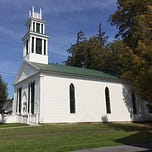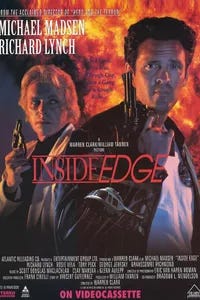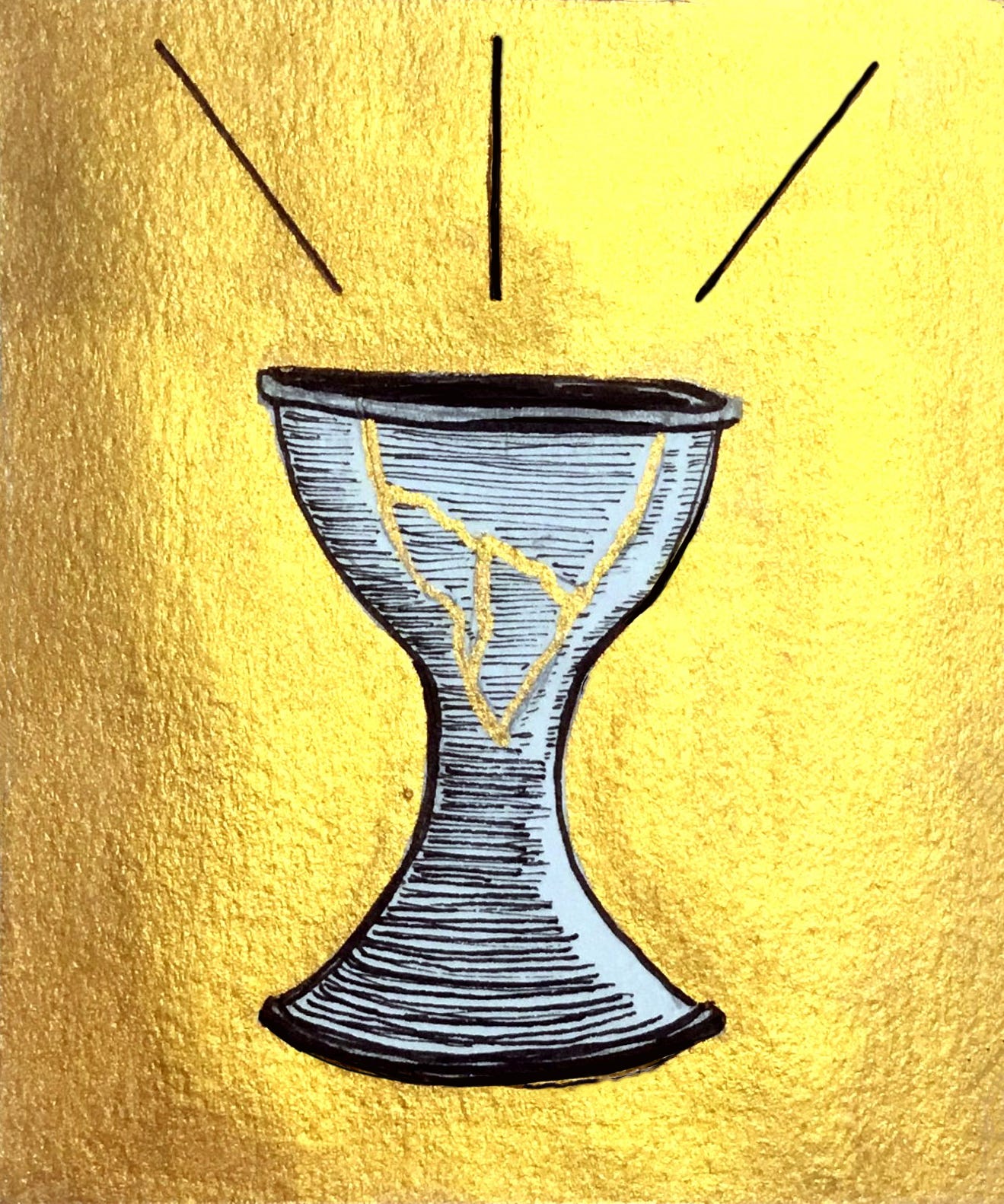Dear Friends,
I was thinking of taking a three-week holiday this summer, stepping back from the day-to-day responsibilities of a dramavangelist, a rather clumsy coinage that I use to describe my work—a dramatist by vocation, an evangelist by calling. If you can come up with a better descriptor, please let me know; I’m wide open.
The proposed holiday has been put on indefinite hold as the GoFundMe campaign for my new play, The Odyssey of King David, has kept me delightfully occupied, and the joy of delivering The Church’s One Foundation to you on a fortnightly basis over the past two years has not abated for a moment. If anything, it’s increased, and though our numbers are modest compared to the literary “giants” of Substack, I’m grateful for every subscriber we have in 45 countries now, and counting.
Here in Indiana, it’s summer that has “come in like a lion,” with day after day in the 90s accompanied by high humidity. Allow me, then, to take a more casual, laid-back approach to our podcasts over the next few weeks, focusing more on the dramatist than the evangelist in me, if that’s even possible. Their fusion may be inseparable.
As I tell my wife as she tends to her plants and birds outside in this heat: “Stay hydrated and don’t forget to wear your hat!”
With Thanks in My Heart for You, Dear Friends!
D. Paul
The Church’s One Foundation is Jesus Christ Her Lord!
Hi-Diddle-Dee-Dee, An Actors Life for Me
Actor, Michael Madsen, passed away earlier this month, July the 3rd, to be precise. His sister, the translucent actress, Virginia Madsen, wrote on X: “"We're not mourning a public figure. We're not mourning a myth—but flesh and blood and a ferocious heart who stormed through life loud, brilliant, and half on fire. Who leaves us echoes — gruff, brilliant, unrepeatable — half legend, half lullaby.”
And I would add: half Elvis Presley and half Jimmy Dean in looks and aura, though inimitable in totality. Michael walked like a star, pranced like one as needed, and had that undeniable mystique that defines stardom. Quentin Tarantino could spot ‘em. Madsen, best known for his volatile roles in “Reservoir Dogs” and the “Kill Bill” movies directed by Tarantino, died of a cardiac arrest at 67. I was saddened to hear it.
I had the opportunity of working with Madsen in a mediocre film shot in Mexico in 1992. He would be the first to call it “mediocre,” if not worse. Shooting in a Tijuana nightclub one evening (or was it Ensenada?), I knew we were in trouble when the “security personnel” brazenly flashed their guns, though there appeared to be no imminent danger. I was not thrilled with the passing thought of dying in the crossfire of rival gangs, nor the prospect of my obituary reading, “Mr. Thomas died in a Tijuana nightclub.” I think of it as the Mexico movie that paid for my Dietrich Bonhoeffer play, which I was writing at the time. Ah, the juxtaposition—"Hi-Diddle-Dee-Dee, An Actors Life for Me!” By today’s standards of senseless violence, gratuitous sex, and incessant swearing, the Mexico movie was tepid in nature. I had a smaller role, but at least billing—Dt. Matt Reeves, or was it Agent Matt Reeves?—there was nothing memorable about the film, including my moniker, and it went “straight to video,” a financial death sentence for most low-budget indies. I never saw the premiere nor any subsequent showings, if there were any. Checking it out a couple of days ago, I thought it might be on Tubi TV where everything seems to land, but, alas, “Inside Edge” is out there somewhere in the “never to be remembered” ether. Not to worry—the crazed Madsen groupies, I’m sure, will find it somewhere.
Madsen couldn’t have been sweeter to me on the set, embarrassingly complimentary, seemingly fascinated with my relationship to the teaching guru of the Actor’s Studio, Lee Strasberg. Despite a melancholic vibe, Michael always had a twinkle in his eye, and, as is the case with most distinctive actors, he had that artistic “third eye,” making him keenly aware of everything going on in and around him. We didn’t “hang out” much, as he and the leading lady, Rosie Vela, seemed to take a particular liking to one another. I and the other lead actor, Richard Lynch, whom I had known from NY days, enjoyed our downtime at the Las Rosas Hotel & Spa, with its spectacular ocean views, infinity pool, and occasional margarita, at least for me, good Episcopalian that I was at the time. Richard, if memory serves, was still “on the wagon,” God bless him. He died in June of 2012, found by actress Carol Vogel in his Yucca Valley, CA, home.
As the Mexico movie was wrapping, Michael confided to me that he was in-between domiciles and didn’t know for sure where he’d be living back in LA. Money was an issue; relationships were an issue; welcome to show biz. I offered him a room in our empty guest quarters, we swapped numbers, and other than a brief, followup conversation, never spoke again. Such is the life of film and theatre—transitory, ephemeral—for when the curtain comes down and the last credit rolls, only the devout remember the names of actors, directors, even the film itself. We may have our top 10 or 20, or even 50 if we’re movie aficionados, but thousands of other movies have gone straight to the video graveyard or languish in obscurity on today’s endless streaming platforms.
Often, the artists languish as well. Richard Lynch, the aforementioned actor, had a torturous beginning to his career while studying with Strasberg at the Actor’s Studio and at the HB Studios, the acronym for the two brilliant teachers, Uta Hagen and her husband, Herbert Berghof. While reportedly under the influence of drugs, Richard (who had already been identified as a brilliant young talent, playing opposite Anne Bancroft and Jason Robards in John Whitings’ The Devils in 1965) set himself on fire in New York’s Central Park in 1967, burning 70% of his body. After multiple surgeries and intensive rehab, he was back on the off-Broadway boards by 1970 in Shelley Winters’ One Night Stands of a Noisy Passenger, co-starring with Robert De Niro, Sally Kirkland, and Diane Ladd. Not a shabby cast. A now sober and charming Richard went on to appear in more than 160 movies and TV shows, his scarred complexion and classical flair blending seamlessly into the iconic villains of Scarecrow, The Sword and the Sorcerer, Little Nikita and dozens of other films. Some of our subscribers may recall Richard Lynch. Most, I suspect, will not. Perhaps the Bard of Avon said it best: …brief candle! Life’s but a walking shadow, a poor player That struts and frets his hour upon the stage, And then is heard no more. (Shakespeare’s “Macbeth,” Act 5, Scene 5)
For most actors, it’s not an easy life. I’ve written before of Shelley Winters cramming her fridge full of food in-between every film, fearful that she would never work again. Even her two Oscars for The Diary of Anne Frank and A Patch of Blue couldn’t contain her fears, a dominant trait in most aspiring and accomplished actors—fear of rejection, fear of poverty, fear of growing old, of losing your good looks, fear of forgetting your lines (every actor’s nightmare), fear of becoming obsolete—irrelevant!—and fear of being discovered as a phony, yes, a phony—a life of make-believe. Now, most “wanna bees,” fortunately, fall between the cracks early, their sole purpose in becoming a “star” shattered in the first few years. Those who are in it for the long haul and somehow eke out a living have my deepest admiration. One NY actor and friend comes to mind: He was a child immigrant and had to deal with a pronounced accent initially. Roles were few and far between. He became a great student of the theatre, studying all the great actors and immersing himself in this mercurial art form we call acting. Today, my friend speaks the King’s English better than I, and is recognized as one of the finest acting teachers in NYC, and significant acting work has come his way in film and TV over the years. He knew it was going to be a marathon, not a sprint. Stardom was not the goal. The pleasure of creating something beautiful was—the joy and excitement in that dramatic “leap of faith”—stepping into another person’s shoes, inhabiting a life different from one’s own, understanding their motives, dreams, and foibles, and, yes, “…to hold, as ‘twere,” as Hamlet says, “the mirror up to nature,” helping us to better understand who we are, and why we are as we are.
Still, regardless of the seemingly inexhaustible delights of the theatre, that proverbial question keeps coming back to haunt most artists: “Is that all there is?” I’ve no doubt that Michael Madsen, despite his success and charming swagger, asked himself that question, or some variant thereof, on more than one occasion. Over the last half century, few actors I’ve spoken to in depth, either the “aspiring or the accomplished,” have not wondered, “Isn’t there something more?”
It is that “more” we will explore together in our next podcast. In way of a clue, might not the psalmist and musician king help point the way?
Let everything that hath breath, praise the Lord (Psalm 150:6 KJV).
Amen!
PS: Dear Friends, if you’d like to support my work, then join me in developing The Odyssey of King David! Go to the link below and make a donation. Any amount will help to achieve the goal of mounting this dramatic one-man show and recording an audio-play version of it. With deepest thanks for your gift! Pressing On! D. Paul















Share this post